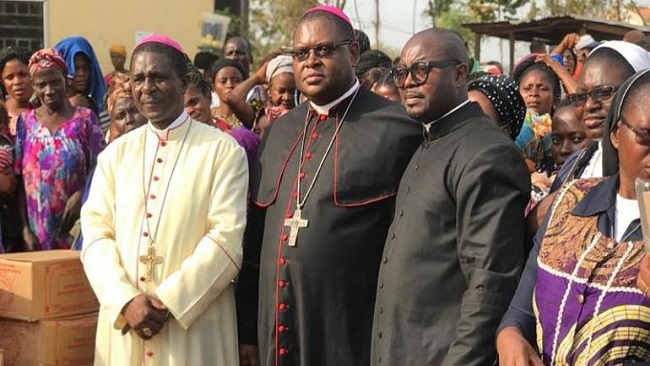Catholic Church caught in the crossfire of worsening Ambazonia crisis
The Catholic Church is increasingly caught in the middle of an escalating crisis in Cameroon’s North West and South West regions with priests shot dead, property destroyed and frequent detentions by armed separatists, according to a high-ranking church official.
“They threatened that they’re going to kill us,” said Bishop Michael Bibi of the Bamenda archdiocese, following a recent detention by armed separatists.
Bibi was detained twice this month by armed groups. On 5 December he attempted to travel from Bamenda, the capital of the North West region, to Kumba, 170 kilometres to the south west, intending to celebrate mass. However, on the road near Batibo his car was stopped and held up by a group describing itself as the “Amba Boys”.
The Amba Boys are one of a number of armed separatist groups fighting the Cameroonian security forces in the North West and South West of the country. The crisis in the Anglophone regions began with protests over perceived marginalisation of Anglophones by the Francophone majority, but has become increasingly violent.
“They saw that I was a Roman Catholic bishop, but they were not willing to listen to me, they demanded my phone and the phones of my driver and his brother,” said Bibi, describing how their car was forced off the road into a clearing in the forest. The Ambazonia fighters brandished hunting rifles and rudimentary weapons.
On this occasion, the local leader of the Amba Boys group told his foot soldiers to return the priest’s phone and let him continue his journey. Bibi went on to Kumba to say mass.
Detained again
The next day the bishop once again encountered an armed group on the road towards Buea. Bibi was due to celebrate mass on 7 December and was travelling the 60 kilometres by road in the South West region.
He had been warned that a group of nuns also had difficulties on the road. They were stopped by the Amba Boys and consequently arrived late for a church service. Nevertheless, Bibi went ahead with his journey because he was “doing missionary work”.
After passing a village on the way to Buea, the capital of the South West region, the Amba Boys “came out with their guns”, according to Bibi. The armed separatists said the bishop should not be travelling owing to the “ghost town” protest that was in force for the day – travel was prohibited.
“They weren’t happy that I didn’t support the ghost town,” the bishop told RFI, explaining that the Ambazonia group had no gripes over whether the man of the cloth was pro-government or a supporter of the separatists.
“It was actually scary,” said Bibi, describing how the armed group kept him for the second time in the forest, this time for four hours. They said he was “breaking the law” for travelling that day given the stay-at-home protest intended to paralyse the area.
“Finally by the grace of God they liberated us,” said Bibi. He was let go, but it was too late to continue travelling by night. So he stayed in a nearby village before leaving early the next morning and celebrating mass.
Caught in the crossfire
Bishop Bibi’s recent experiences on the road in Cameroon’s Anglophone regions are indicative of a greater threat facing priests. A number have been killed in recent violence while church property has also been targeted.
Kenyan priest Cosmas Omboto, who was doing missionary work in Cameroon, was killed in Kembong village near Mamfe in November. He was recently flown back and buried in his native Kisii. Some media reports suggested he was killed during a church service.
Gerard Anjiangwe, a seminarian, was killed in Bamessing village near Bamenda in October. “He was shot by the military and died on the spot,” said Bibi.
Father Alexander Sob of the Buea diocese was killed in Muyuka town, on the road between Kumba and Buea in July. He was shot while sitting in a car.
Church property has been targeted, according to Bishop Bibi. A Roman Catholic primary school in Bamessing was recently set ablaze and a grotto containing religious statues was destroyed. A statue of the Virgin Mary was broken and another statue stolen. Attackers also set a parish vehicle on fire.
The separatist groups are not happy with the Church’s stance on the ghost town protests and in particular the closure of schools, according to Bibi. The Church does not support the closing of schools despite the ongoing crisis.
On the other hand, the church has called for the complete demilitarisation of the Anglophone regions, an initiative it thinks will help bring about peace. But this is not looked upon favourably by the government.
“The church is sandwiched between the government and the Boys,” says the bishop. “Whatever the church does, whatever the church says, either the government accuses the church of supporting the Boys or the Boys accuse the church of supporting the government.”
Church-led mediation
There have been previous calls for the church to spearhead mediation for the Anglophone crisis. The International Crisis Group, a London-based think-tank, said that the Catholic Church remains one of the few “prospective peacemakers”.
“If we are requested at any time to come in, to give our own contribution towards the resolution of the crisis, we are not going to hesitate to do that,” said Bibi, referring to the possibility of mediation.
“We just want the government and those that are fighting the cause to know that the church stands for the truth, the church stands for justice and we are ready to stick out our necks and speak the truth because only the truth is going to set us free,” he added, referencing a passage from the gospel of John.
Source: Modern Ghana





